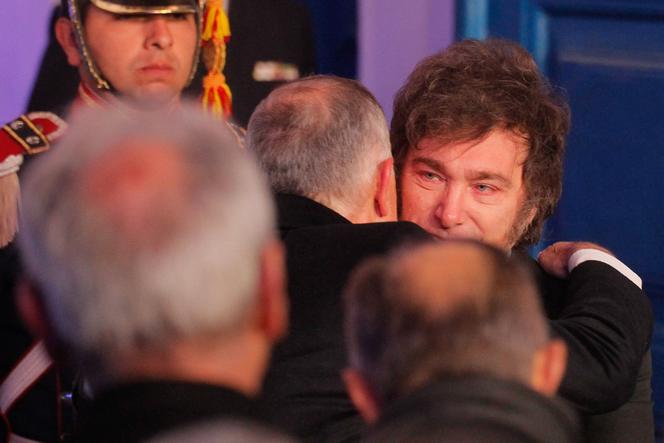


Javier Milei and Victoria Villarruel were jubilant as they climbed aboard a tank. Separated by a machine gun, Argentina's far-right president and his vice president held hands and waved to the crowd, laughing, as the tank rolled down Buenos Aires' sprawling Avenida del Libertador.
For more than two hours on Tuesday, July 9, the country's independence day, 7,000 soldiers and 70 vehicles covered the broad tree-lined avenue, which was flown over by 62 fighter jets and helicopters, to the shouts of "Long live the country!" from the hundreds of thousands of people who went to brave the cold of the Southern Hemisphere winter.
Except under the government of Mauricio Macri (right, 2015-2019), the tradition of the military parade was abandoned during the Peronist (center-left) mandates of the last two decades, in favor of large-scale popular celebrations. "What a pleasure to see a patriotic act with military bands, grenadiers, the army, the air force and the heroes of the Falklands War," said Agustin Romo, deputy of the president's party, La Libertad Avanza, on Twitter/X. "We are finally leaving behind the parades of communist transvestites and drug addicts."
On the tank, with arms raised, Milei had reason to celebrate. A few hours earlier, 1,200 kilometers away, in San Miguel de Tucuman, capital of the province of the same name, he was posing alongside 18 of the country's 24 governors, all from the opposition, who had just signed his "May Pact," a 10-point document designed to "put [the Argentine people] back on the path to development and prosperity."
Against all odds, the president succeeded in obtaining what he had been waiting months for: the support of governors for his project. Forming a welcoming line on either side of the head of state, in the historic Tucuman House, where independence was signed on July 9, 1816, the 18 men took turns ratifying the document in a carefully staged ceremony. "The government wants to overplay its idea of refounding the country, with strong symbols like the 'May Pact' and the military parade," said Pablo Ortemberg, historian at the National Council for Scientific and Technical Research and professor at the National University of San Martin. He says he hates the state and wants to destroy it, but he is "in love with the symbols of the state."
Milei hoped that the text would be signed on May 25, another Argentine national holiday – hence the name of the agreement. Eventually, he had to wait during two months of tough negotiations. "We are announcing the beginning of a new order for our country," he said triumphantly in a speech delivered shortly after midnight.
You have 59.87% of this article left to read. The rest is for subscribers only.
